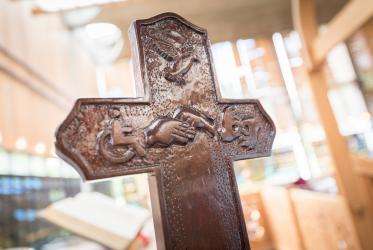By Dr Manoj Kurian (*)
How economies will fare after the current financial seism has passed will depend very much on how governments and civil society are able to care for the welfare and health of their people during the crisis.
An ongoing concern for the World Health Organization (WHO) - the issue of how the financial crisis impacts health expenditure across the world - also interests civil society and faith-based organizations. It is a good sign that two major meetings will soon bring the matter into the public spotlight.
In April, members of the European Region of the WHO will meet in Oslo to discuss the impact of the financial crisis on health. In July, the African Religious Health Assets Program will explore the intersection of religion and health at a conference in Cape Town with the theme "When Religion and Health Align: Mobilizing Religious Health Assets for Transformation". The WHO has already convened a high-level consultation on the issue during its Executive Board meeting in January 2009.
Though societies in wealthier countries have been hard hit by this financial crisis, the world cannot afford a reduction in their current commitments to social expenditure. There is absolutely no room for cutbacks in social expenditures by governments or civil society organizations.
Today the fabric of human society is stretched thin. Even before the financial crisis hit, a third of the population of sub-Saharan Africa and more than 20 per cent of the population of South Asia was going hungry.
Past financial crises - for example, the global financial crisis of the early 1980s, the Asian economic crisis in the late 1990s and the Latin American crisis in 2000 - have demonstrated the critical role civil society organizations can play in the recovery of societies.
When crisis stares at communities, civil society is by their side. Cooperatives, community centres, mosques, temples and churches do not disappear. They remain, helping communities to cope. Governments must remain engaged as well.
In times of crisis, a significant additional burden is taken on by these service providers in the non-government and private not-for-profit sectors, including faith-based and church-related organizations, cooperatives and movements such as the Red Cross and Red Crescent.
There is growing recognition of the contribution made by faith-based organizations to health care. A major study undertaken by the African Religious Health Assets Program in 2006 estimated that between 30 and 70 per cent of health care services in Africa were owned by faith-based organizations.
Though contributions by non-government and not-for-profit organizations are invaluable, they are not necessarily reflected in the budget lines of governmental health expenditures. Governments need to recognize the assets and services that civil society provides, and see them as part of their national strategy; engage them; assist and resource them; and hold them accountable.
Although it is too early to tell, initial reports from several countries indicate reductions in staff and other cost-saving measures by a number of NGOs, while demand for services has increased significantly. In some countries, government subsidies to the private not-for-profit sector - including faith-based organizations providing health services - have been diminishing.
Many of the key campaigns to combat disease and to keep global public health objectives on track to achieve the Millennium Development Goals are heavily dependent on international cooperation and support. Cutting back on funding would jeopardise ongoing treatment of millions of people affected by diseases such as HIV and tuberculosis. This would not only infringe fundamental rights of these individuals, but it would also have potentially disastrous consequences for public health.
At the same time there are hard questions to be answered by civil society organizations. While rightly challenging governments and the international community, they must examine themselves in a forthright and frank manner. Are they working together with the wider civil society? Are they working closely with the governments? Are they offering their institutional, human and financial assets to the service of society in a non-partisan manner?
These questions have to be answered with honesty at all levels. The lasting lesson that the global financial crisis should bring to society is an increased awareness of what is ultimately its greatest asset: the people.
(*) Dr Manoj Kurian, a medical doctor from Malaysia, is programme executive for health and healing at the World Council of Churches.









